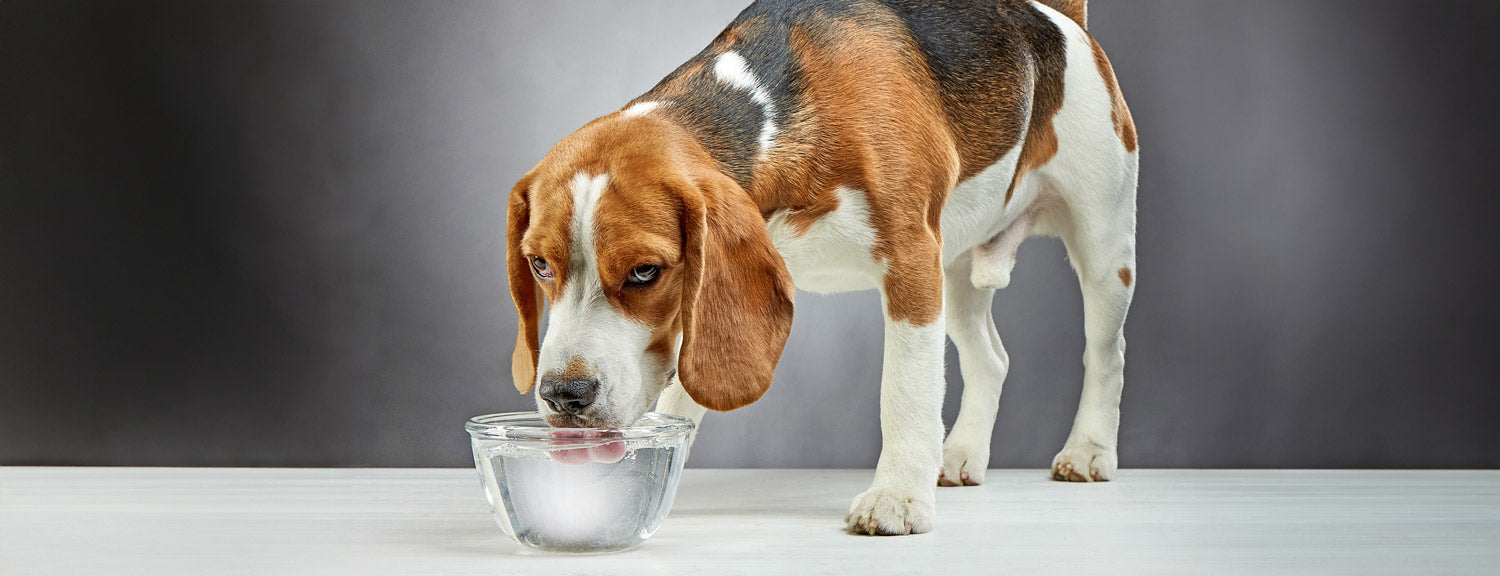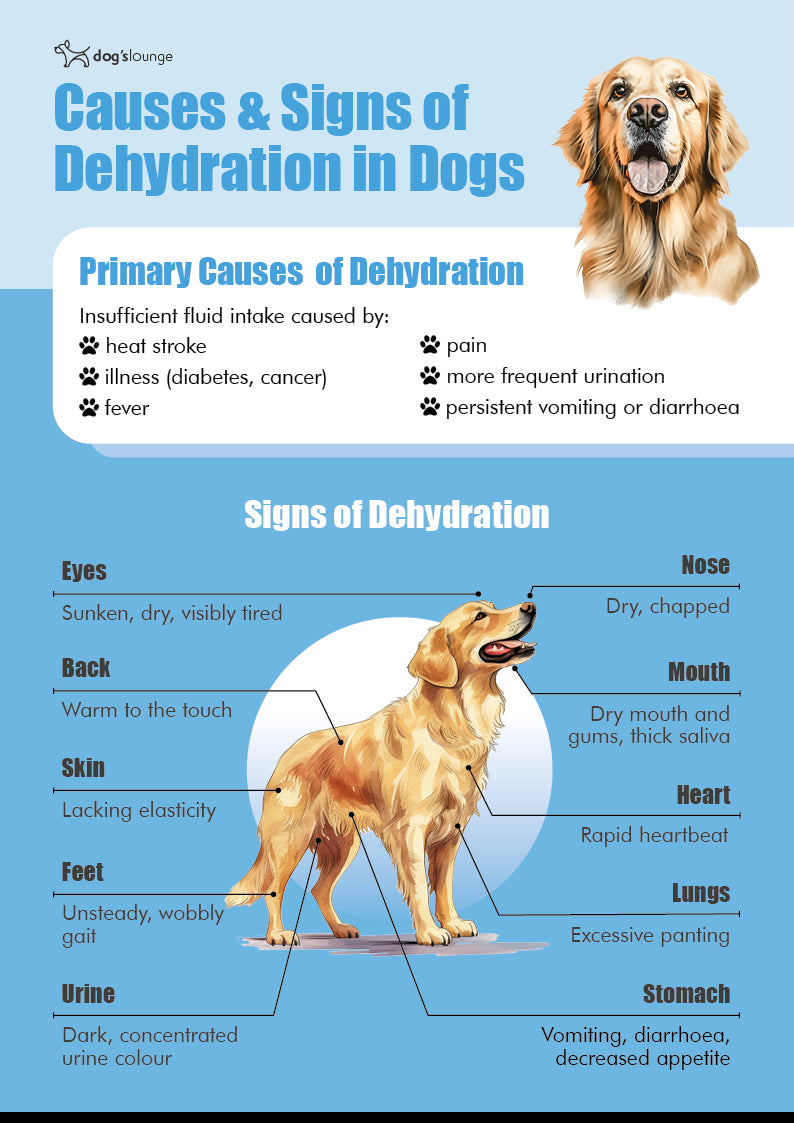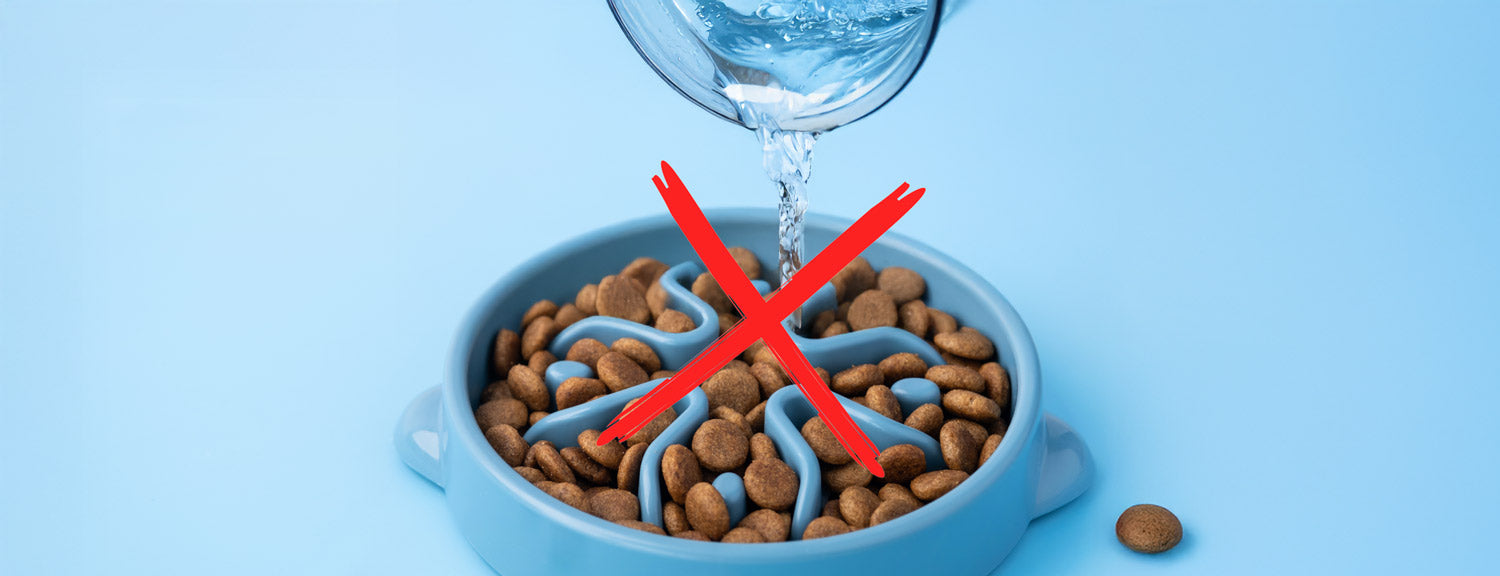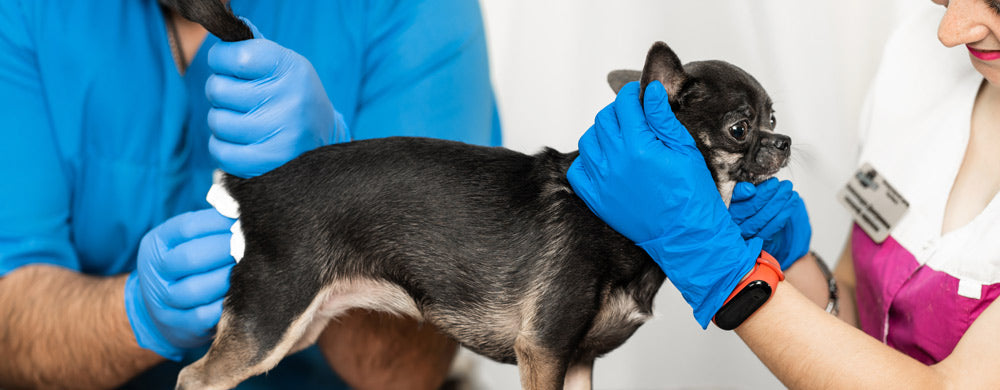Your basket is empty

Causes & Signs of Dehydration in Dogs
February 27, 2024 3 min read
Dehydration in dogs is a serious issue that can lead to severe health problems and, in extreme circumstances, the animal's death. It occurs when a dog loses more bodily fluids than it consumes, resulting in a deficiency of water and electrolytes. Understanding the causes and recognising the signs of dehydration can help dog owners take swift actions to prevent complications and ensure their pet's health and well-being.

***
Causes of Dehydration in Dogs
Dehydration in dogs can arise from various factors, often involving increased fluid loss or decreased fluid intake. Some common causes include:
- Excessive urination – Conditions such as diabetes or kidney disease can lead to increased urination, resulting in significant fluid loss.
- Vomiting and diarrhoea – Gastrointestinal issues that cause vomiting or diarrhoea can rapidly deplete the body's water and electrolytes.
- Fever or overheating – High body temperatures, due to fever or exposure to high environmental temperatures, can increase fluid loss through panting and evaporation.
- Insufficient water intake – Lack of access to fresh water, especially during hot weather or after vigorous exercise, can lead to dehydration.
- Illness or injury – Certain diseases or injuries, especially those involving blood loss, can disrupt fluid balance and lead to dehydration.
When a dog's body reaches a stage where its usual water consumption is insufficient to counterbalance the loss of fluids, there is a consequent decline in both blood flow and fluid volume. This situation leads to a diminished supply of oxygen to the body's organs and tissues. Moreover, dehydration in dogs precipitates a depletion of vital electrolytes, including sodium, chloride, and potassium. These essential minerals perform several critical roles within the body, such as:
- Ensuring the body's pH remains balanced
- Transporting nutrients into cells
- Supporting muscle function
- Overseeing nerve function
In the gravest instances of dehydration in dogs, an acute shortage of fluids can precipitate the failure of vital organs, including the kidneys.
***
Signs of Dehydration in Dogs
Recognising the signs of dehydration in dogs is crucial for early intervention. Some common symptoms include:
- Loss of skin elasticity – One of the simplest ways to check for dehydration is the skin tent test. Gently pinch the skin on the back of the dog's neck or between the shoulder blades. In a hydrated dog, the skin will quickly return to its normal position. In a dehydrated dog, the skin will return slowly or remain tented.
- Dry gums and nose – Dehydrated dogs often have dry, sticky gums, and their noses may also be dry.
- Lethargy – A dehydrated dog may appear tired, lethargic, or less interested in activities they usually enjoy.
- Increased heart rate – Dehydration can lead to an increased heart rate, which can be noted by feeling the heartbeat on the chest or the inside of the hind leg.
- Sunken eyes – In severe cases, a dehydrated dog's eyes may appear sunken or lack their usual brightness.
- Panting – While dogs naturally pant to cool down, excessive panting without recent heat exposure or physical activity can indicate dehydration.
***
Preventing and Treating Dehydration
Prevention is key when it comes to dehydration. Ensure your dog has constant access to clean, fresh water. During hot weather or after exercise, monitor your dog closely for signs of overheating and increase their water intake. If your dog shows signs of dehydration, encourage them to drink small amounts of water and contact a veterinarian immediately. In severe cases, intravenous or subcutaneous fluids may be necessary to rehydrate your dog and restore electrolyte balance.
***
Conclusion
Dehydration in dogs is a preventable condition with potentially serious consequences. By understanding its causes and recognising the early signs, dog owners can take swift action to ensure their pets remain healthy and hydrated. Always consult a veterinarian if you suspect your dog is dehydrated, as they can provide the necessary treatment and guidance to address the underlying cause and prevent future occurrences.
Also in Pet Advice

Should You Add Water to Your Dog’s Kibble? Here’s What the Science Says
August 14, 2025 7 min read
Should you add water to your dog’s kibble? Discover the science-backed pros, cons, and better alternatives like bone broth and fresh food to improve hydration, digestion, and overall canine health...

DIY Frozen Dog Treats Your Pup Will Love
June 27, 2025 4 min read
Summer heat can be dangerous for dogs, making hydration more important than ever. Learn how to spot signs of dehydration, boost your pup’s water intake, and create fun, frozen recipes to keep them happy and healthy all season long.

Why Is My Dog Scooting? Common Causes and How Diet Can Help
May 09, 2025 4 min read
If your dog is scooting or smells fishy, it could be due to blocked or irritated anal glands. Learn what causes blocked anal glands, which dogs are most at risk, and how simple dietary changes—like adding fibre and anti-inflammatory nutrients—can help prevent recurring problems.
